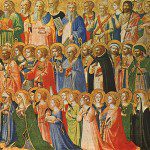![Ladder of Divine Ascent by Anonymous [Public domain], via Wikimedia Commons](https://wp-media.patheos.com/blogs/sites/637/2017/03/Ladder_of_Divine_Ascent_GIM-238x300.jpg)
The Lord has concealed from those in the world the tough, but fine, nature of this struggle. Indeed, if people really understood it, no one would renounce the world. Still, offer your labors gladly to Christ in your youth and He will make your old age happy with abundant goodness. The things which they have gathered in their youth will come to the support and encouragement of those worn down by age, so we should toil zealously when we are young and run our course with serious hearths. Death can come at any time, and we have countless hidden enemies – evil enemies, harsh enemies, wicked enemies with fire in their hands, wishing to set the Lord’s temple alight with the flame that is in it. These enemies are powerful, unsleeping, incorporeal and unseen. [2]
John tells us the reason for some of the secrets of God – it is not because Jesus does not desire to share them with us, but because if we received them when we are not ready, they will frighten us and possibly stop us from taking the initiative to follow Christ. If we knew what was in store for us, we would be very afraid. John, having experienced the journey, can warn us – he can explain why the secret has not been revealed to us – and it is because he is great in God and full of love, unattached to himself, that he does so instead of rest in his achievements. He was able to see through the pride which comes to us once we have attained some level of holiness. As he humbled himself, as he silenced the self with its pride, he was able to open up to God and hear what God had to say to him. “The lover of silence draws close to God. He talks to Him in secret and God enlightens him.”[3]
After John was enlightened by God, he gave an indication of the journey which he went through, warning people of the potential hazards as well as the glories to come. In humility, he also realized that however invaluable his manual was, its value was derivative in nature. He provided a map of the spiritual quest, with each possible advance a step which presents its own difficulties and temptations. What was good came from God, often in forms beyond his ability to express, and yet he felt that his work could provide each reader a clue to their own spiritual condition and what they must face next. Thus, he was able to say of the work which he produced:
I have put together a ladder of ascent, though my meager knowledge makes me something of a second-rate architect. Still, let each one take note on the step on which he is standing. Is it on the step of self-will, of fame, of a loose tongue, of hot temper? Or of possessiveness? Is it on the step of atonement for sin, of greater zeal, of loving fire added to fire? “The last shall be first and the first last” (Matt. 19:30). The first seven are the work of the world’s week, and some are good while others are not. But on the eighth clearly bears the mark of the age to come.[4]
Using Jacob’s Ladder as an exemplar, John suggested our journey to the kingdom of heaven is like a ladder, which begins on earth and ends in heaven. We find ourselves beginning our climb up the ladder full of sin, and our journey begins with impurity, but if we reach the last step, we will find it ends with purity. Each step of the way, we find that those who open themselves more to Christ, and so engage more and more of the silencing of the self, the Word will come to them and render to them all they shall need. Then what they have been given they can proclaim to all, not as knowledge handed down to them from the experiences of others but from their own encounter with Christ:
The consubstantial Word brings purity to completion, and His presence destroys death, and when death is done away with, the disciple of sacred knowledge is illuminated. The Word of the Lord, being from the Lord, remains eternally pure.
The man who does not know God speaks about Him only in probabilities.
Purity makes a disciple someone who can speak of God, and he can move on to a knowledge of the Trinity. [5]
We are stuck in spiritual death so long as the decay of sin continues to encase us and establish in us a self which we hold in opposition to God. As we seek grace which purifies us, so the decay will crumble around the encased self, so that the Word can come to us and bring us life and truth. The more we open up and receive the mysteries of Christ, the more we become a true disciple and friend of the Word, until at last, we have climbed to the top of the spiritual ladder and find that the Holy Trinity welcomes us up with love and provides us a space within so that we can participate in the divine life. To get there, all we need to do lift ourselves up out of the mire of sin through the ladder of grace. If we do so, then we will find that we shall truly know God, receiving the beatitude which shall never end.
[1] This is all implied by many passages in the Gospels, such as these found in Matt 13:1-12: “Then the disciples came and said to him, “Why do you speak to them in parables?” And he answered them, ‘To you it has been given to know the secrets of the kingdom of heaven, but to them it has not been given. For to him who has will more be given, and he will have abundance; but from him who has not, even what he has will be taken away’” (RSV).
[2] St John Climacus, The Ladder of Divine Ascent. Trans. Colm Luibheid and Normal Russell (New York: Paulist Press, 1982), 79.
[3] St John Climacus, The Ladder of Divine Ascent, 159.
[4] St John Climacus, The Ladder of Divine Ascent, 265.
[5] St John Climacus, The Ladder of Divine Ascent, 288.
Stay in touch! Like A Little Bit of Nothing on Facebook:
A Little Bit of Nothing

















